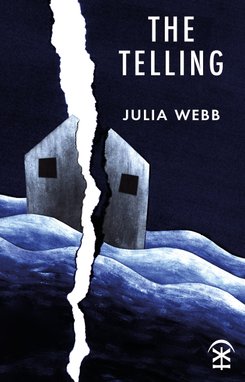REVIEW: JULIA WEBB’S ‘THE TELLING’
Reviewed by Stella Backhouse

I sometimes wonder if World War One is alive and well and dwelling among us. Take me. My maternal grandfather was a boozer, probably because it was the easiest way of blotting out the traumatic legacy of trench warfare that the culture he lived in deemed it unmanly to admit to. Shame and anger about his alcoholism and the domestic violence that came with it scarred my mother; and growing up around a constantly-simmering fury whose origins neither of us, perhaps, was equipped to understand also affected me, I now believe. For these reasons, I felt an instinctive affinity with Julia Webb’s recent collection The Telling, and its themes of trauma darkly visited on succeeding generations and the decoding of memory for clues to the roots of lifelong unease.
Even more than Threat, Webb’s earlier collection, The Telling is claustrophobically focused on her dysfunctional family. Her parents are something of a mystery to her. In ‘Crash Site’, her mother is depicted as a wrecked plane “her damaged fuselage suspended precariously/between two broken pine trees”. But as “we never did find that black box…each survivor told a different story”. After his wife’s death, her explosively volatile father becomes introverted and unreadable, “caught in the matrix/of his mind, he spends days, weeks,/trying to find a way back out”. There are hints that the marriage was dominated by his gargantuan sexual appetites: “Father enters the garden as a rhinoceros/with a preposterous horn,/he thunders across the lawn, bellowing”. “Bedding your father/is like bedding a swarm” confides their mother, oblivious to her children’s embarrassment.
A disturbing sequence about Webb’s grandmother provides some possible keys to unlocking the past. In keeping with recurrent imagery of water in all its forms, Grandmother, bearing “life buoys and flares”, at first presents as salvation from the rising tide of chaotic parenting engulfing the children; but her security is false: “beneath her calm surface/was a deeper water -/a vortex that led to the underworld”. The chilling lines “I called and called for her/but she was in the kitchen,/humming loudly as she laid out/the ham and pickles for his tea” suggest both the banality of evil and the deliberate turning of blind eyes to unspeakable deeds.
Moving through life, later poems document damaged relationships with ex-lovers and other family members, for example Webb’s sister. These are poems about how shared past divides as well as unites families, depending on how it is interpreted. But taking my cue from the collection’s title, I think they’re also about something else: I think they’re about how poetry can help us articulate the realities of dysfunctional relationships.
To convey this, Webb deploys a number of poetic techniques. In common with others, the title poem contracts and dilates between the proximity and distance, dizzily ricocheting from line to line between the words and the silence that coexist inside a single relationship: “the guilt we don’t speak of/and my father’s words piling up behind me/shoving me over the precipice”. The concluding lines, where Webb – in another recurring hunter/hunted image – is “a rabbit caught in the headlights/inviting her grief to mow me down”, suggest indecision between running away and longing to be defined – even if only as roadkill, martyred to the inescapable past.
But beyond poetics, I detect a message about poetry itself. ‘girl was born’ describes second birth, perhaps after discovering poetry’s potential: “there was no way of returning to where she had come from/she picked up a twig shaped like a gun and aimed it”. ‘My glasses say’ meanwhile ostensibly describes Webb’s relationship with her spectacles – but perhaps these glasses have metaphorically poetic lenses. When Webb says “My glasses like me to see both sides of thing[s],/when I am with them things get forensic./We have a co-dependent relationship -/they need me so they can see the world”, it is poetry that we glimpse as coping mechanism, and poet as conduit for clamouring truth.
Distance is a concept that features frequently in this collection. But poetry – The Telling – offers a bridge across. It is an uncertain route. Truth can hurt. But as Webb says of her glasses “They tell me to sweep away the leaves that clog my eyes/so I can see the world in all its brightness”.
The Telling is available online direct from publisher Nine Arches Press, as well as other bookshops and retailers.
